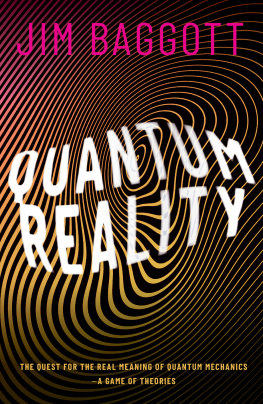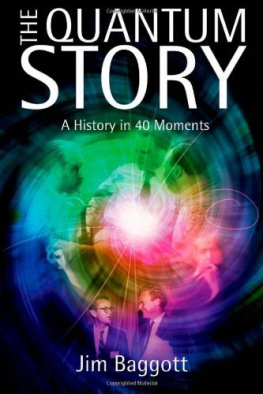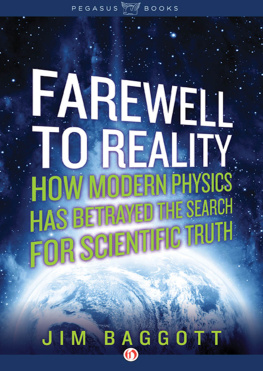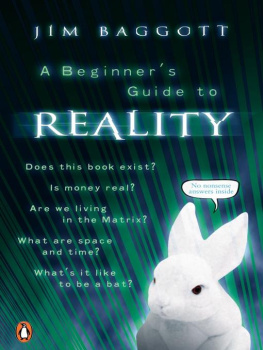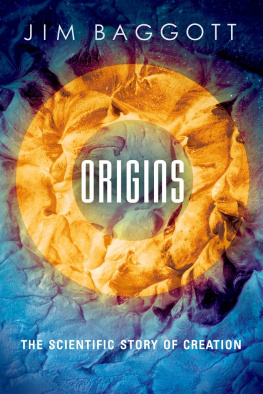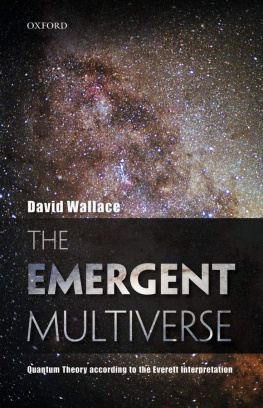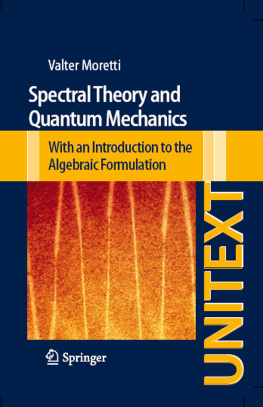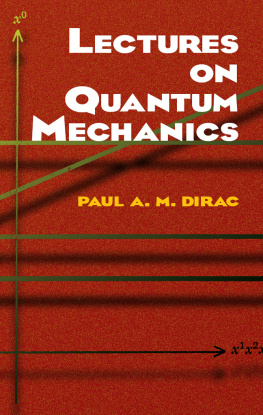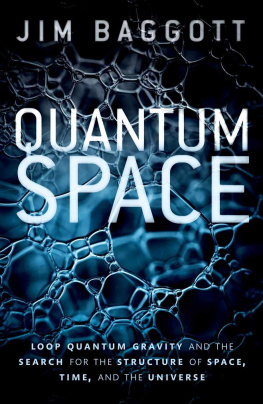Quantum Reality

Great Clarendon Street, Oxford, ox 2 6 dp , United Kingdom
Oxford University Press is a department of the University of Oxford. It furthers the Universitys objective of excellence in research, scholarship, and education by publishing worldwide. Oxford is a registered trade mark of Oxford University Press in the UK and in certain other countries
Jim Baggott 2020
The moral rights of the author have been asserted
First Edition published in 2020
Impression: 1
All rights reserved. No part of this publication may be reproduced, stored in a retrieval system, or transmitted, in any form or by any means, without the prior permission in writing of Oxford University Press, or as expressly permitted by law, by licence or under terms agreed with the appropriate reprographics rights organization. Enquiries concerning reproduction outside the scope of the above should be sent to the Rights Department, Oxford University Press, at the address above
You must not circulate this work in any other form and you must impose this same condition on any acquirer
Published in the United States of America by Oxford University Press
198 Madison Avenue, New York, NY 10016, United States of America
British Library Cataloguing in Publication Data
Data available
Library of Congress Control Number: 9780198830160
ISBN 9780198830153
ebook ISBN 9780192565839
Printed and bound in Great Britain by Clays Ltd, Elcograf S.p.A.
To Ian Mills
Who taught me quite a lot about quantum mechanics
Contents
The Complete Guide to Quantum Mechanics (Abridged)
Everything Youve Ever Wanted to Know, and a Few Things You Didnt
Just What is This Thing Called Reality, Anyway?
The Philosopher and the Scientist: Metaphysical Preconceptions and Empirical Data
Sailing on the Sea of Representation
How Scientific Theories Work (and Sometimes Dont)
When Einstein Came Down to Breakfast
Because You Cant Write a Book About Quantum Mechanics without a Chapter on the BohrEinstein Debate
Quantum Mechanics is Complete So Just Shut Up and Calculate
The View from Scylla: The Legacy of Copenhagen, Relational Quantum Mechanics, and the Role of Information
Quantum Mechanics is Complete But We Need to Reinterpret What it Says
Revisiting Quantum Probability: Reasonable Axioms, Consistent Histories, and QBism
Quantum Mechanics is Incomplete So We Need to Add Some Things
Statistical Interpretations Based on Local and Crypto Non-local Hidden Variables
Quantum Mechanics is Incomplete So We Need to Add Some Other Things
Pilot Waves, Quantum Potentials, and Physical Collapse Mechanisms
Quantum Mechanics is Incomplete Because We Need to Include My Mind (or Should That be Your Mind?)
Von Neumanns Ego, Wigners Friend, the Participatory Universe, and the Quantum Ghost in the Machine
Quantum Mechanics is Incomplete Because. Okay, I Give Up
The View from Charybdis: Everett, Many Worlds, and the Multiverse
Jim Baggott is an award-winning science writer. A former academic scientist, he now works as an independent business consultant but maintains a broad interest in science, philosophy, and history and continues to write on these subjects in his spare time. His previous books have been widely acclaimed and include the following:
The Quantum Cookbook: Mathematical Recipes for the Foundations of Quantum Mechanics
Quantum Space: Loop Quantum Gravity and the Search for the Structure of Space, Time, and the Universe
Mass:The Quest to Understand Matter from Greek Atoms to Quantum Fields
Origins: The Scientific Story of Creation
Farewell to Reality: How Fairy-tale Physics Betrays the Search for Scientific Truth
Higgs: The Invention and Discovery of the God Particle
The Quantum Story: A History in 40 Moments
Atomic: The First War of Physics and the Secret History of the Atom Bomb 193949, short-listed for the Duke of Westminster Medal for Military Literature
A Beginners Guide to Reality
Beyond Measure: Modern Physics, Philosophy, and the Meaning of Quantum Theory
Perfect Symmetry: The Accidental Discovery of Buckminsterfullerene
The Meaning of Quantum Theory: A Guide for Students of Chemistry and Physics
I know why youre here.
You know that quantum mechanics is an extraordinarily successful scientific theory, on which much of our modern, tech-obsessed lifestyles depend, from smartphones to streaming to satellites. You also know that it is completely mad. Its discovery forced open the window on all those comfortable notions we had gathered about physical reality from our nave interpretation of Isaac Newtons laws of motion, and unceremoniously shoved them out. Although quantum mechanics quite obviously works, it appears to leave us chasing ghosts and phantoms, particles that are waves and waves that are particles, cats that are at once both alive and dead, lots of seemingly spooky goings-on, and a desperate desire to lie down quietly in a darkened room.
But, hold on. If were prepared to be a little more specific about what we mean when we talk about reality and a little more circumspect about how we think a scientific theory might represent such a reality, then all the mystery goes away.
Im not kidding. I have a bit of a reputation as the kind of guy you might find in the kitchen at parties; the kind who spoils all the fun, bursting the bubbles of excitable mystery and urban myth (what Americans sometimes call woo) with a cold scepticism and a calculating rationality. Spock, not Kirk (or McCoy). One commentator recently called me depressingly sane. This is a badge Im happy to wear with pride. There are many popular books you can buy about the weirdness and the woo of quantum mechanics. This isnt one of them.
And in any case thats not why youre here.
Butlets be absolutely cleara book that says, Honestly, there is no mystery would not only be a bit dull and uninteresting (no matter how well it was written), it would also be completely untrue. For sure we can rid ourselves of all the mystery in quantum mechanics but only by abandoning any hope of deepening our understanding of nature. We must become content to use the quantum representation simply as a way to perform calculations and make predictions, and we must resist the temptation to ask: But how does nature actually do that? And there lies the rub: for what is the purpose of a scientific theory if not to aid our understanding of the physical world?
Lets be under no illusions. The choice we face is a philosophical one. There is absolutely nothing scientifically wrong with a depressingly sane interpretation of quantum mechanics in which there is no mystery. If we choose instead to pull on the loose thread we are inevitably obliged to take the quantum representation at face value, and interpret its concepts rather more literally. Surprise, surprise. The fabric unravels to give us all those things about the quantum world that we find utterly baffling, and were right back where we started.

